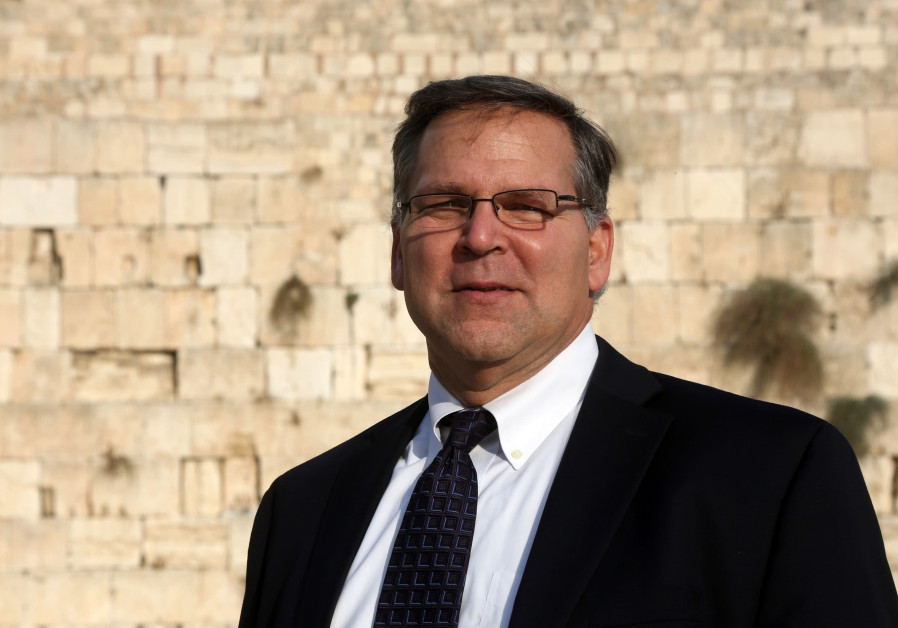Diaspora clause in nation-state bill called ‘patronizing’

Jerry Silverman standing at the Western Wall. . (photo credit: MARC ISRAEL SELLEM/THE JERUSALEM POST)
Jerry Silverman, the president and CEO of the Jewish Federations of North America, has described the Diaspora clause in the Jewish nation-state bill as being “definitively patronizing” to world Jewry, asserting that the previous version of a clause on exclusive religious communities has been damaging to Israel’s standing in the Jewish and broader world.
Speaking to The Jerusalem Post on Monday, Silverman said that while the controversial Diaspora clause would not limit the government’s ability to educate Israeli citizens about the Jewish world abroad, it could potentially impact the advancement of pluralism in Israel.
The clause currently says that: “The state will act in the Diaspora to maintain the connection between the state and the Jewish people,” whereas the original version omitted the word “Diaspora” and said that the connection would be maintained among “the Jewish people, wherever they are.”
The clause was approved by the Constitution, Law and Justice Committee on Monday and is now certain to be part of the law if it is approved in its final readings later this week.
The United Torah Judaism Party said that it insisted on the change to the clause to stymie the advance of religious pluralism and egalitarian prayer at the Western Wall.
Several leaders of Diaspora organizations and progressive Jewish denominations argued that because the clause only requires Israel to improve the Israel-Diaspora relationship in the Diaspora and not in Israel, it was arrogant and paternalistic towards Diaspora Jews.
Silverman himself met with officials in the Prime Minister’s Office to try and convince them to change the clause, but was ultimately unsuccessful.
“The clause in its current language definitively comes across as patronizing,” Silverman told the Post.
“There’s a difference in only talking about unity of the Jewish people in the Diaspora but not everywhere.”
He described the clause as “a disappointment,” and said that he had talked to “a number of Jewish leaders from various Jewish organizations across America who were extremely troubled by the language in the nationstate bill” regarding the Diaspora clause, as well as the clause that originally allowed for Jewish-only communities and the one changing the status of the Arabic language.
Silverman said that the concern among the Diaspora leadership is that if certain issues regarding religious pluralism end up in the High Court of Justice, as they often do, the Diaspora clause of the nationstate bill could be used to hinder arguments in favor of pluralism.
He acknowledged, however, that it was unclear if this indeed would be the case, and that it was uncertain what the impact of the clause would be.
Silverman said, though, that the officials he met with had made “a very sincere effort to listen to our concerns across the board,” and that he had appreciated this attempt.
He also refused to criticize Prime Minister Benjamin Netanyahu for a lack of leadership over the bill, saying that he could not put himself in the prime minister’s shoes and that he had to weigh many different concerns on such a bill.
Likud officials have downplayed the impact of the clause, describing the new wording as “mere semantics that would have no impact.”
In relation to the exclusive communities clause based on religion or ethnicity, Silverman said that the mere fact that such terms had been included in the original bill, and passed in its first reading, had been damaging to Israel’s standing.
The original version of the clause would have permitted communities to limit themselves to people of their own religion or ethnicity. It was intended to counteract a Supreme Court decision that barred Jewish communities from prohibiting Arabs but permitted minorities to prohibit Jews, but has now been changed to say that “the state sees national value in developing Jewish settlement.”
Silverman said the original version “created an outcry from all of the Diaspora,” and that the initial language had created comparisons with the US in the 1940s and 1950s “when Jews weren’t allowed in certain neighborhoods and Jews weren’t allowed in certain organizations and clubs.”
The JFNA leader said that even though the clause had been changed, it gave fuel to the BDS movement against Israel.
“When we are trying to truly support Israel, fight BDS and… educate young adults and connect them to Israel, these things are barriers and really create challenges for us,” said Silverman.
He said, however, that he “applauded the Knesset process” in changing the clause, but that the MKs and government officials advancing it “must really think through intended and unintended consequences of a bill that potentially could affect Israel’s standing in the world and in the Diaspora.”
Silverman said he is “not crazy” about the new version of the clause, but that it was much better than the previous wording.
In a meeting on Monday of the Likud faction, Netanyahu called the bill “legislation of unprecedented importance.”
“I hope we pass this bill in the days ahead in order to guarantee the foundation of our existence, which is: Israel being the nation-state of the Jewish people,” Netanyahu said.
But Zionist Union MK Nachman Shai, who wrote a book about Israel’s public diplomacy, told the committee legislating the bill Monday morning that the bill would be very harmful.
“The clause calling for Judaizing the Galilee sounds even worse in English than it does in Hebrew and would cause Israel great damage,” Shai said.
The committee will hold marathon sessions to vote on proposed revisions to the bill on Tuesday, in order to prepare it for its final readings in the Knesset plenum as early as Wednesday evening.
“I expect there to be no problems passing the bill,” coalition chairman David Amsalem told reporters at the Knesset.






Comments are closed.